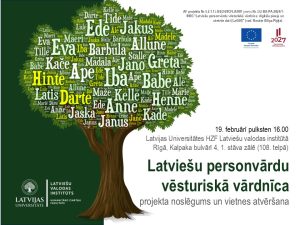
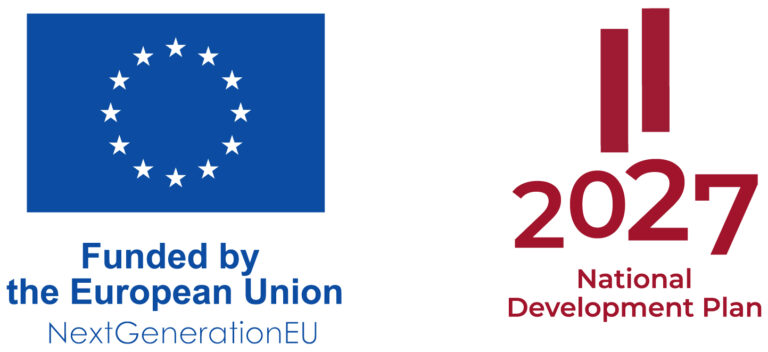
The project “Livonic Dialect in Courland: Conception and Methodology of New Classification” (LiviDo) develops an appropriate methodology and uses research approaches that have so far been little known in Latvian dialectology (used mainly in sociolinguistics and geolinguistics) to develop a scientific concept for the delimitation of new boundaries of the Tamian subdialects and the evaluation of more appropriate terminology for naming this group of Livonic dialect. The research is based on the most recent dialectal data collected so far in the 21st century, and the project also aims to collect new dialectal data in the unexplored territory of the Tamian subdialects, especially in the borderline of the deep and the non-deep Tamian subdialects of the Livonic dialect, as well as in the transitional zone of the Livonic and the Couronic subdialects of the Central dialect. To reconstruct the dialectal data, early audio materials of the Courland Livonic dialect from the second half of the 20th century will be digitalized and analysed. The main results of the project will be published on the Open Access website dialekti.lu.lv.
The aim of the project: To create a new classification of the Livonic dialect spoken in Northern Courland, based on newer dialectal data collected in the 21st century and comparing them to oldest ones acquired in the second half of the 20th century.
Project leader: Ph.D. Daira Vēvere
Duration: 01.09.2024–31.08.2025.
Funding: European Union, National Development Plan
From March to June 2025, for the needs of the project, the Joint-Stock Company “Rīgas Kinostudija” digitized almost 300 audio recordings of dialects, which are stored in tape format in the library of the Faculty of Humanities of the University of Latvia. Such work is very necessary not only to be able to play back and process these recordings with modern equipment, but also to prevent the destruction of these early audio recordings (1950s–1980s) and to preserve the opportunity for next generations to deal with them as needed, whether for research interests or personal purposes.
Participation in the international scientific conference to commemorate the 152nd anniversary of academician Jānis Endzelīns “From the first book to digital texts: the development of language in 500 years” organized by the Latvian Language Institute of the Faculty of Humanities of the University of Latvia with the paper “Tamian subdialects from the first mention in texts to the present day” (Riga), which examined the development of the Tamian subdialects of the Livonian dialect from the first mention in texts to modern research and emphasizing the need for digital tools for dialect processing and more convenient use in research.
Mobility to Vilnius, Lithuania, Lithuanian Language Institute, the Research Centre of Geolinguistics, as a result of which gained experience in professional and scientific work, learned more about the latest projects and main results of Lithuanian colleagues, learned current techniques and methods in dialectology and geolinguistics, got acquainted with the dialect database created and maintained at the Lithuanian Language Institute, established contacts with Lithuanian colleagues for further cooperation both in everyday work and in the implementation of joint scientific projects, worked in the library of the Lithuanian Language Institute with theoretical literature.
Participation in the international scientific conference “Topical Issues in Baltic Language Research” organised by the Faculty of Humanities of the University of Latvia in commemoration of the 100th anniversary of Professor Marta Rudzīte (1924–1996) with the paper “Directions of Change in the Livonic dialect of Vidzeme and Kurzeme” (Riga), which examined the dynamics of phonetic and morphological features of Livonic dialect, comparing contemporary material with the data gathered in the 20th century. The aim of the study was to compare the present-day material with the material from the middle / second half of the century in order to identify the tendencies in the use of dialectal phenomena in both subdialectal groups of Livonic dialect.
Participation in the international scientific conference “Methodological Innovations in the Study of Linguistic Variation” organised by the Centre of Geolinguistics of the Institute of the Lithuanian Language with the paper “Towards a New Terminology in Latvian Geolinguistics: the Case of Livonic Dialect of Courland”, in which D. Vēvere focused on the problems related to the adaptation of appropriate terminology to modern territorial varieties of the language, assessing the validity of the traditional division of the Tamian subdialects of the Livonic dialect into deep and non-deep, as well as proposing new models of classification of the Livonic dialect of Courland according to the real linguistic landscape of today.
A grant agreement has been signed with the University of Latvia for the implementation of the project funded by the Recovery and Resilience Mechanism Plan 5.2 Reform and investment axis “Ensuring a change in the governance model of higher education institutions”.

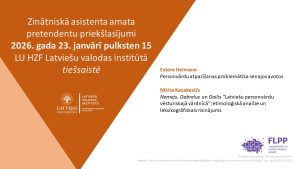
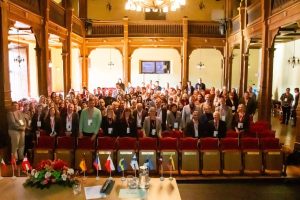
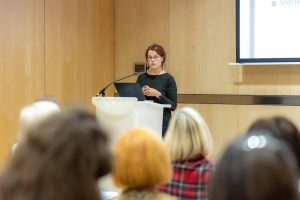
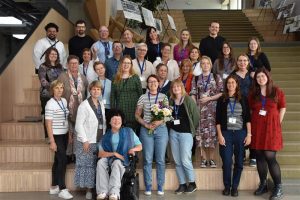
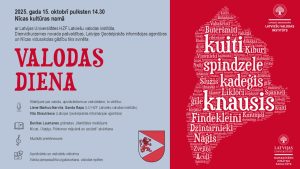

LU Latviešu valodas institūts
Kalpaka bulvāris 4 (111., 308. telpa)
Rīga, LV-1050
☏ 67034016
Seko mums
© Citējot un pārpublicējot no LU Latviešu valodas institūta mājaslapas, atsauce obligāta.